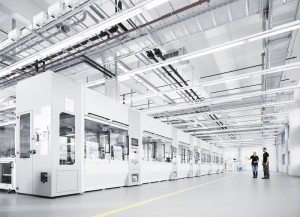
Idea Watch: Industry 4.0 finds increasing application in production
December 24, 2015 | By MRO Staff
 (Photo: Festo AG & Co. KG)
(Photo: Festo AG & Co. KG) Germany – The implementation of Industry 4.0 is an ongoing process that involves challenges, but also offers great potential for the automation industry – Festo recognized this at an early stage. The key elements of industrial digitalization are the individual components, which communicate with each other within the overall system and can control and regulate themselves. The tasks of the human employee are also changing from merely operating machines to solving complex problems. In shaping the production of the future, Festo is therefore strategically concentrating on a triad comprising new technologies, state-of-the-art training and further education, and the human at the focus of attention.
Germany – The implementation of Industry 4.0 is an ongoing process that involves challenges, but also offers great potential for the automation industry – Festo recognized this at an early stage. The key elements of industrial digitalization are the individual components, which communicate with each other within the overall system and can control and regulate themselves. The tasks of the human employee are also changing from merely operating machines to solving complex problems. In shaping the production of the future, Festo is therefore strategically concentrating on a triad comprising new technologies, state-of-the-art training and further education, and the human at the focus of attention.
For manufacturing companies in high-wage countries, Industry 4.0 provides an opportunity for remaining competitive on a global scale. “Especially in Germany, the merging of production technology and IT can be made highly efficient. This country not only holds a great deal of knowledge and innovative power; with its public funding of research activities, the political sphere is helping to secure success for the transformation being brought about by Industry 4.0,” says Dr. Eberhard Veit, Chairman of the Management Board of Festo AG & Co. KG.
“Plattform Industrie 4.0” provides orientation
Close cooperation between the industrial associations and the spheres of industry and politics is ensured by “Plattform Industrie 4.0”, a consortium established to create a basis for a uniform understanding of the concept of Industry 4.0. Technological standards are being developed here, along with business models and new forms of cooperation that will strengthen the global competitiveness of the industry. “In interdisciplinary groups, the participants in ‘Plattform Industrie 4.0’ are carrying out intensive work on the future topics of standardization, research and safety, but also regarding aspects of new working worlds and training,” explains Dr. Veit. “We are talking here about the transformation of industrial manufacture into a fully networked, flexible production system. To remain competitive, we must take the initiative with our characteristic spirit of inventiveness and give shape to this new development.”
Digitalisation is the basis
This transformation in the world of production is founded on digitalization, a crucial element in the merging of the virtual and real worlds. Dr. Claus Jessen, Board Member Product Supply at Festo, sees great potential here: “Digital refinement will give rise to increasingly intelligent products. In future, the individual elements of an overall system will be able to communicate with each other and autonomously control and regulate themselves. They are the core of industrial digitalisation and support the production process through enhanced functionality – from self-sufficient energy supply up to condition monitoring.” Festo is working in close collaboration with its customers to develop new concepts and business models – from the development of communication-capable components with decentralised intelligence, to their integration into superordinate automation environments, up to new service models.
Industry 4.0 for in-house production
The automation specialist is relying on Industry 4.0 not only for its products, but also for its own production processes. Pilot projects have already been initiated at the new Technology Plant in Ostfildern-Scharnhausen, and there is ample room for future innovations and implementation. In this way, new relevant technologies can be put into practice to keep abreast with developments in the industry.
Qualification as a success factor
The human operator is and will remain to be the key element of modern production, but will be assigned more and more new tasks. “The role of the human within the industrial value creation process is now being transferred from that of a machinery operator to a problem-solver. New requirements will arise, for which employees will be prepared by means of appropriate education and training measures. To an increasing extent, education is becoming the key success factor,” explains Dr. Jessen. The topic of learning also plays a central role at the Scharnhausen Technology Plant. This is a matter of great importance to Dr. Jessen, who played a leading role in creating the new factory in his role of Board Member for Product Supply: “We have integrated a Learning Factory into our plant where we can convey teaching content in a practical way, directly on location.”
For more information, visit www.festo.press.
